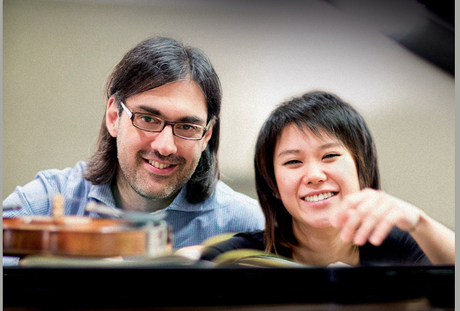by Paul J. Pelkonen

Leonidas Kavakos and Yuja Wang.
Photo by Benjamin Ealovega © 2014 Decca/Universal Music Group
The pair appeared as part of Ms. Wang's "Perspectives" series, which is what that historic venue calls its artistic residencies. They chose to open with Brahms' Sonata No. 2 in A, one of that composer's most genial and conversational works. It even starts politely, with violinist and pianist each hesitating to allow the other instrument to "speak." This device is the gateway to an amiable flood of notes, a conversation in virtuosity that never lost its easy tone.
The pair next delved the depths of so-called Soviet "socialist realism" with Prokofiev's Violin Sonata No. 1 in F Major. This is one of the composer's darkest creations, written in the uncertain years that followed World War II and shot through with strict attempts to stay inside the (party) lines that were established for artistic expression in the twilight years of Stalin's regime The composer starts this massive four-movement sonata with a funeral march, and things only get grimmer from there.
It can be argued that playing a work like this at this high level shows Prokofiev's ultimate triumph over his oppressors. The work slides shiftily into some innovative territories, brusque staccato licks from the piano, slithering figurations from the violin and a sense of absolute rhythmic control that looks back to the composer's earliest works. In effect, its four movements, in the hands of these artists became a kind of career summation of Prokofiev's work, ending right back where it started with the opening funeral dirge.
The second half moved in brighter directions. First came the rhythmic firestorm of Bartók's Rhapsody No. 2. Here, pianist and violinist played off each other with the apparent ease of long musical partnership. They pulled the listener into a frenzy of whip-saw rhythmic playing with the abandon and energy of a Budapest town band. These spicy, perky rhythms built on each other in a dizzying fashion, culminating in a whirling tumult of sound.
Richard Strauss is known for his tone poems and later his operas. However, he wrote chamber music as a young man. The lone Violin Sonata was composed when he was 23. It marks Strauss' last foray into abstract music before a lifetime of programmatic material. Strauss looks forward and back here, with Ms. Wang and Mr. Kavakos wandering through the dreamy middle movement labeled "Impromptu" by the composer. It was followed by an uplifting finale, that made use of the same rising major progressions that make appearances in Don Juan, Ein Heldenleben and Der Rosenkavalier. (Perhaps one could attribute its appearance in the later works to the composer's penchant for self-quotation, but that's an argument for another column.)
The program concluded with a pair of shimmering encores. First came the tricky, stammering third movement of Brahms' Sonata No. 3. This was not the easy, breezy Brahms of the first work, but the sound of nervous internal dialogue, roiled waters of unfulfilled passion in this most romantic of composers. Then, they played the biggest treat of the night, the wispy yet demanding "La Fontaine d’Arethuse" from Karol Szymanowski's Mythes. This dream-like movement went off, despite the best efforts of an ill-timed cell phone, and the audience's attempt to applaud at a false ending. (They were halted by a stern gesture from Mr. Kavakos.)
If you enjoyed this article, it's time to click over to Superconductor's Patreon page, and help support the cost of independent music journalism in New York City at the low cost of just $5/month.

